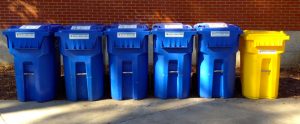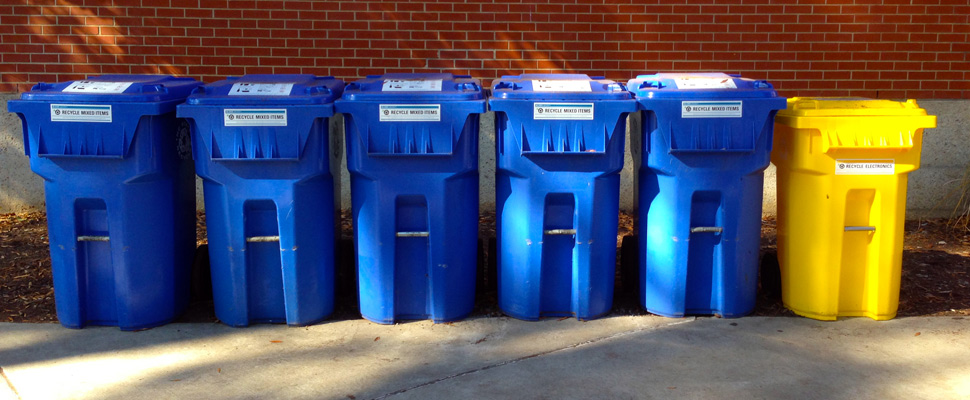This guest post is written by Alli Kenlan, an NC State student and member of the NC State Stewards sustainability leadership program.
 Test your recycling knowledge with this quick quiz about whether the following statements are reality or myth. Some of the statements are part truth and part myth.
Test your recycling knowledge with this quick quiz about whether the following statements are reality or myth. Some of the statements are part truth and part myth.
Bottle caps are not recyclable
True and False. According to the City of Raleigh, plastic caps on plastic bottles can be recycled when attached to the bottle. In fact, it’s better to keep the cap on the bottle when it is recycled. Loose caps end up in landfills, but caps left on plastic bottles help bottles keep their shape, which helps with the sorting process. One important exception: plastic caps on glass bottles should be removed.
Plastic bags can’t be recycled
True and False. Plastic bags create havoc in machines at recycling processing centers. That’s why plastic bags have to be collected separately so they can go to a different processing machine. Plastic bag recycling bins can be found in all C-stores on campus and at most local grocery stores. Recyclable material that arrives at the recycling center in a plastic bag is usually sent to the landfill.
Most things at the recycling plant end up in the landfill anyway
False. In 2016, NC State’s Waste Reduction and Recycling office diverted 49% of campus waste from local landfills. Those recyclables are sent to a Raleigh-based material recovery facility (MRF), where items are sorted, processed and sold to companies that use the material to create new products. Anything that cannot be recycled is called residual waste and accounts for less than 10% of material that enters the MRF.
Compostable materials are also recyclable
False. Starch-based products like the compostable cups and silverware you get at Talley are not recyclable and should go into the composting bin. Soiled paper products, like paper towels and napkins, should also go into compost bins (dry paper products can be recycled). Composting bins on campus are located at Talley and the Oval (as well as some administrative buildings). And finally, pizza box composting bins are at seven campus locations.
Recycled materials become less valuable after processing
True and False. Downcycling is when an item, such as a plastic bottle, is recycled into something of lesser value. Upcycling is when materials are recycled into something of more value. Whether a material you recycle ends up being of more value or less value, it is still better than that item going to landfill where it has no value.
When in doubt, go to landfill
True. If you’re not sure what to do with a particular item, it is best to put it in the landfill bin. But, it isn’t hard to remember the recycling rules. Most bins are informatively labeled, and there are plenty of online resources (such as NC State’s A to Z recycling guide) that can answer even your trickiest of recycling questions. There aren’t any excuses to not know what to recycle.
Have other questions? Contact NC State’s Waste Reduction and Recycling Office.
